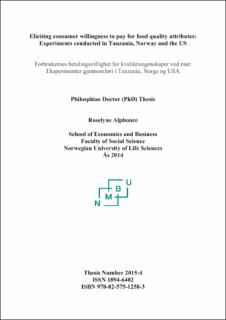| dc.contributor.advisor | Alfnes, Frode | |
| dc.contributor.author | Alphonce, Roselyn | |
| dc.date.accessioned | 2020-11-10T13:34:09Z | |
| dc.date.available | 2020-11-10T13:34:09Z | |
| dc.date.issued | 2020-11-10 | |
| dc.identifier.isbn | 978-82-575-1258-3 | |
| dc.identifier.issn | 1894-6402 | |
| dc.identifier.uri | https://hdl.handle.net/11250/2687169 | |
| dc.description.abstract | In assessing and measuring consumer preference and
willingness to pay for quality attributes, many things matter
including context and choice of methods. This thesis
focuses on two themes; (1) assessing consumer preference
for food quality in different context and (2) testing for
difference between WTP elicitation methods. The thesis
contains four independent papers based on data from
experiments conducted in Tanzania, Norway and the US.
Paper 1 and 2 assess consumer WTP for attributes related to
food safety in Tanzania. On top of assessing consumer
preference, Paper 2 also compares consumer WTP in four
different elicitation techniques. Both paper 1&2 find that
consumers in Tanzania are concerned with food safety, and
the results are consistent across all the four methods, across
gender and consumers income level (low or high)..
Paper 2 finds that the size of the premium between the
valuation methods differ when consumers choose between
alternatives than when consumers indicate their willingness
to pay. This underscores the importance of choice of the
elicitation method in valuation of goods. Paper 3
investigates whether there exist a consumer-citizen duality
in WTP for food safety standards in restaurants. The paper
finds that both consumers and citizens are willing to pay for
improved food safety standards, however voting citizens
exhibit higher willingness to pay than buying consumers.
The study suggests that relying on consumer studies
focusing on the buying context to advice on public issues
may underestimate the actual support for public regulations.
Paper 4 assess Norwegian consumer preferences for sensory
and other attributes of dried fruits from Africa. The paper
mainly aimed at making recommendations to producers in
Africa trying to position value-added products for
maximum revenue from Europe. The results suggest that
consumers have strong preference for naturalness over
uniform taste. However sensory characteristics are still
important. The study identifies three consumer segments,
two with distinct reasons for preferring a country-of-origin
and the third is indifferent to the country of origin of the
dried fruits. The study suggests the use of naturalness and
fair-trade as a marketing strategy for selling such products
in Europe. | nb_NO |
| dc.description.sponsorship | NUFU/NORHED | nb_NO |
| dc.language.iso | eng | nb_NO |
| dc.publisher | Norwegian University of Life Sciences, Ås | |
| dc.relation.ispartofseries | PhD Thesis;2015:4 | |
| dc.title | Eliciting consumer willingness to pay for food quality attributes : experiments conducted in Tanzania, Norway and the US | nb_NO |
| dc.title.alternative | Forbrukernes betalingsvillighet for kvalitetsegenskaper ved mat : eksperimenter gjennomført i Tanzania, Norge og USA | nb_NO |
| dc.type | Doctoral thesis | nb_NO |
| dc.source.pagenumber | 103 | nb_NO |
